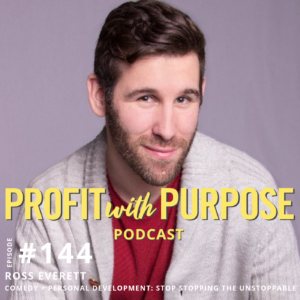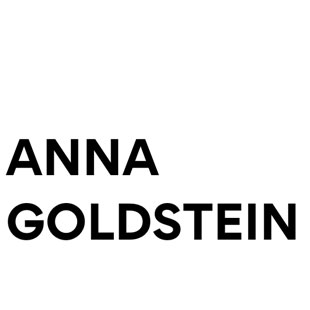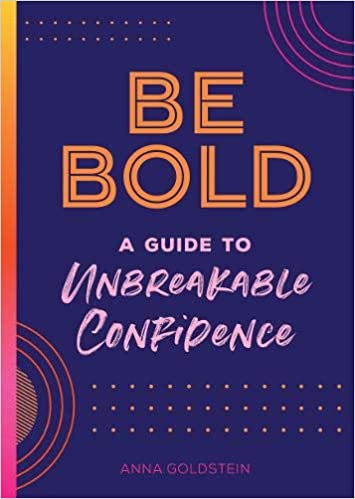Ross Everett is an award-winning actor, comedian, Internet personality, and writer. His YouTube videos have been viewed over 45 million times, landing him on the front page of HuffPost, Buzzfeed, and Reddit. His comedy has been featured on NBC, Hulu, Fox, and Sirius XM. He can be seen touring with his critically acclaimed comedy show Stop Stopping The Unstoppable a personal development seminar parody, where he plays a motivational speaker, Dale Thorhammer.

There wasn’t a time when Ross wasn’t into comedy. He loved things that made him laugh from a very young age. If people are funny, then everything else was forgivable.
Were your parents funny?
Not intentionally. Ross’ Dad has good comedy thoughts but poor delivery. His mum is adorable in her own way. When she runs, she looks like a duck running away from a car. They aren’t people who can engage a crowd in a comedic way.
Delivery is key.
Delivery is all of it. The most important thing in comedy is timing. But this can also apply to life. How are you delivering anything you want to be delivered? It is a real shame to say something that is meant to be heard in a way it can not be.
Personal development plus comedy. That’s awesome.
Ross wants to create joy and help other people find their joy and go after it. A lot of comedians come from this negative place and then find this desire to make people laugh. A sense of humor is often a defense mechanism. Ross didn’t want to be a comedian who was depressed. He loves personal development and wanted to find a way to combine the two. As a comedian, you get to deliver joy and happiness. As a kid, he wanted to be famous so that he could have friends all over the world. He admits that a lot of this comes from feeling uncool and unpopular at school. He wanted people to like him. Sometimes we become good at something because of a trauma or as a defense mechanism. We can heal the underlying wound and still maintain the benefits that that wound gave us.
How did you get started? Comedy is not an easy path.
As a kid, Ross loved watching scrubs and Family Guy. He and his friends would reference those TV shows and make jokes that could’ve been in the TV shows. It was their joy. He started writing his own scripts and ideas for TV shows. In college, he began making things with a video camera. They started putting their videos on YouTube and gained a following. After graduation Ross worked at the Colbert Report as an intern. He got a joke on the show and it was a lightbulb moment to know that his joke was going out to the country.
Ross learned a lot from Colbert about how to approach comedy. He considers Colbert and Conan to be big inspirations to him. Colbert told him one of his humor philosophies. You never make the victim of a situation the punchline of a joke. People will laugh, but it will sound like they have blood in their mouths. He made a joke about Lindsey Lohan and felt bad about it because she’s just a human being going through her own thing. He won’t punch down on people.
There’s a lot of risks that you take in comedy. Not only in content but in how it’s received.
You can’t control how something is received. Ross makes sure that he feels good about what he’s putting out there. He has his own guidelines for his comedy.
What are they?
Never punch down.
The guidelines shifts as society shifts in the way it perceives people. Ross gives himself permission to elevate his standards with the times while forgiving himself for the stuff in the past before he knew better.
Tell us about your failures.
He took his show to Adelaide, Australia for the Fringe Festival. When he was flyering, he would pitch the show by saying, “Do you want to come see a feel-good comedy show?”
This woman walked by, heard him say this, and went to see the show. She sat in the front row. The show is a parody of a self-development seminar, and he plays a guru. It’s a very interactive show with a lot of audience participation. There’s a moment where he takes the audience through a funny guided mediation. He tells them to go back to their childhood when everything was okay and feel that now. He noticed that the woman had moved into the fetal position. He though great I can help her. He had a part of the show where he bought someone up on stage and made them dance. So he got her up and she meekly came on stage. He noticed this look of fear in her eyes.
She said, “Please don’t make me do this.”
He quickly reversed and put her back in her seat and told her to stay after the show because he wanted to make sure she was okay.
The show ends with people saying, “I love myself!” He noticed the woman was not feeling it. At the end of the show, she bolts out of the theatre. He runs after her. She shouts that “she’s fine’.” He can’t get to her and thinks that his show just ruined someone’s life. He feels he pushed on someone he shouldn’t have pushed on. He goes back to the artist area, devastated. He thinks that he can’t do this anymore and that the show is dangerous. He believed that a lot of people call themselves life coaches after reading a book or going to a seminar. If you unearth someone’s deep traumatic stuff and can’t bring them back up again, you’ve done damage. Ross’s number 1 rule is don’t do damage. Even though the show was about doing it in a silly way, he still did damage.
He checks his email, and there was an email from the crying woman apologizing for running out after the show. After crying in the bathroom for 15 minutes, she was fine. She thought the show was brilliant and thanked him for doing it. He met up with her to talk about what happened. She said she was in a down mood anyway and her childhood wasn’t great. He asked her what he could say instead, and she said – ‘go back to a time when everything was great.’ Everybody has a time when everything was great. So he changed that part of the show. He made a new rule that if somebody is resisting him, instead of trying to get them out of their funk, he will play towards the people who are already loving it.
You do some coaching in the show.
There is some real personal development in the show. But the comedy comes first. He takes real personal development concepts and wraps them in idiocy and comedy. He wants to make it fun and palatable. But he realized that he has to be careful with his words. Although that failure was a nightmare, he learned from it, and it made the show better.
Do you go to self-development seminars?
All the time. He used to be resistant to personal development seminars. He would wonder what they were trying to sell him. He wouldn’t trust them. That’s why he wanted to create this show. Because he doesn’t ask his audience to trust him, he asks them to play with him.
Comedy is funny because there is truth in it. Do you think people are more likely to go to a personal development seminar after seeing your show?
Ross hopes that his show arms them to go to a seminar and not have to take it too seriously. He wants people to be able to go to these seminars and have fun with them.
What’s your favorite seminar?
Ross loved Tony Robbins, Date With Destiny. That was fun and impactful. Watching Tony Robbins do his stuff is amazing. He is a master and a showman.
I’m a huge Tony Robbins fan, but there’s all this stuff in the media right now. I’m curious about your authentic take on him. Do you think he’s the real deal?
Ross thinks Tony Robbins show’s up as Tony Robbins when that is who he needs to be. And that he’s human like the rest of us. Ross thinks Tony Robbins does good work and he provides a tremendous amount of value to people.
What’s the best advice you’ve ever been given?
Never leave the site of a decision without taking massive action that forces you to commit.
How can we learn about you?
Instagram: https://www.instagram.com/therosseverett/
Instagram: https://www.instagram.com/dalethorhammer/

Search
Popular Posts
- 02 Mar 2008The Flowering of Human Consciousness 7 Comments
- 01 May 2014Using Visualization to Create What You Want 7 Comments
- 26 Mar 20133 Questions to Change Your Career 4 Comments
- 14 Mar 2014I walked on Fire! 4 Comments
- 29 May 2014How to Bust Through Your Fear 4 Comments

